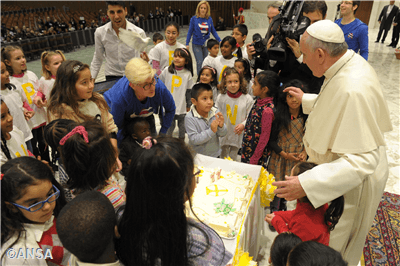Cardinal Tarcisio Bertone, the designated successor to Cardinal Angelo Sodano as Vatican Secretary of State, gave his vision for the future of the Church’s public role. He was supposed to speak at a conference in Rome on Friday, but pulled out when the announcement of his promotion was made. Still, the Vatican released the text of his remarks on “the social doctrine of the Church for a new humanism worthy of love.”
There’s nothing groundbreaking in the remarks, but it’s an interesting nonethless because it may show some hints at what Bertone may see as priorities in his new job.
To understand the public posture of the Church, the cardinal says, one must have some understanding of Catholic social teaching, because Christian moral principles “can seem inhuman when they are separated from their context.” The Church’s social doctrine, he observes, envisions “a democratic humanism of Christian inspiration,” which should be “a civilization of love.” Human energy alone cannot build up such a society, he says, and therefore the Church must constantly respond to ideologies that pretend otherwise: “to individualism and collectivism, to materialism and racism, to statism and biological or cultural nationalism, to classical or partisan utilitarianism.” The solutions that the Church suggests for society’s problems, Cardinal Bertone continues, are clearly in contrast to the proposals offered by secularism. Nevertheles, he says, the Church offers “an authentic concept of modernity.” He rejects the “unfounded prejudice that puts science in opposition to faith.” That dualistic approach, he charges, has produced violence and inhumanity.
Cardinal Bertone decries the emerges of a political outlook that is “economic and technocratic, which concedes an absolute primacy to pragmatism,” and operates on the assumption that government leaders are “the only experts” capable of organizing society properly. Against that vision, the cardinal offers a Christian perspective that begins with “a general conception of life and a political perspective” that is rooted in “the dignity of man, of truth, of justice, of solidarity,of brotherhood—tied to the transcendent principles of Christianity.”




